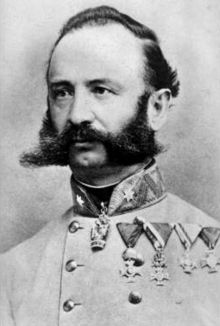Joseph Philippovich von Philippsberg
Joseph Freiherr Philippovich von Philippsberg (born April 28, 1818 in Gospić ; † August 6, 1889 in Prague ) was a Croatian-Austrian nobleman and military officer .
Life
Philippovich entered the military in 1836, trained at the Pioneer Corps School in Tulln and became a lieutenant in 1839. He was in charge of the construction of the kuk Military Geography Institute in Vienna and then dealt with mapping . In 1848 he served as a major in the Warasdin border regiment. He distinguished himself under Joseph Jelačić von Bužim in the suppression of the Hungarian revolution and in 1857 became colonel and commander of the 5th border regiment. In 1859 he was promoted to major general and brigade commander.
Philippovich fought in the Union of the 8th Army Corps (FML Benedek ) in Italy in 1859 and was raised to the hereditary baron status in 1860 . He took part in the campaign in Bohemia in 1866 as adjutant to Count Karl von Thun and Hohenstein , who was then the commanding general of the II Army Corps.
Philippovich then came to Vienna as a field marshal lieutenant and division commander . He later became state commander of Tyrol and Vorarlberg , where he resided in Innsbruck . In 1872 he was transferred to Brno and promoted to Feldzeugmeister in January 1874 . In June he was then appointed regional commander of Bohemia .
In July 1878, Philippovich took over command of the troops destined for the invasion of Bosnia and subjected these countries to Austrian rule in the occupation campaign in Bosnia . His troops took Sarajevo on August 19 , which was then elevated to the state capital.
Philippovich returned to Vienna in 1880 and back to Prague in 1882 as the state commander of Bohemia. In December he became the commander of the 8th Army Corps of the Austro-Hungarian Army .
The Philippovich camp in Sarajevo was named after him, with an area of around 30 hectares, one of the largest barracks in the Austro-Hungarian monarchy. The predominantly three-story shell of the complex designed by the architects Karl Paržik and Ludwig Huber was completed in 1897. In 1901 the barracks were opened. The Philippovich camp primarily housed infantry, artillery and logistics troops; it was located at the western end of Sarajevo between Marijin Dvor and Pofalići.
Joseph had a brother two years his junior, Franz Philippovich von Philippsberg (1820–1903). This also took up the military career and also made it to the Feldzeugmeister. Her second nephew (son of her cousin Nikolaus) was the economist Eugen Philippovich von Philippsberg .
Museum reception
In the Vienna Army History Museum there is a showcase in room V ("Franz-Joseph-Saal") in which objects from Philippovich's personal belongings are exhibited. In addition, loot from the occupation campaign of 1878 can be seen, some of which were brought home from this campaign by Philippovich himself and some by other Austro-Hungarian officers. These include an insurgent flag and oriental weapons.
literature
- Constantin von Wurzbach : Philippović von Philippsberg, Joseph Freiherr . In: Biographisches Lexikon des Kaiserthums Oesterreich . 22nd part. Imperial-Royal Court and State Printing Office, Vienna 1870, p. 210 f. ( Digitized version ).
- Karl Sommeregger: Philippovic von Philippsberg, Josef Freiherr . In: Allgemeine Deutsche Biographie (ADB). Volume 53, Duncker & Humblot, Leipzig 1907, p. 54 f.
- Rainer Egger : Philippovich von Philippsberg Josef Frh .. In: Austrian Biographical Lexicon 1815–1950 (ÖBL). Volume 8, Verlag der Österreichischen Akademie der Wissenschaften, Vienna 1983, ISBN 3-7001-0187-2 , p. 44 f. (Direct links on p. 44 , p. 45 ).
- Biographical lexicon on the history of the Czech lands. Published on behalf of the Collegium Carolinum (Institute) by Ferdinand Seibt , Hans Lemberg , Helmut Slapnicka, Volume III, Oldenbourg Verlag Munich 2000, ISBN 3-486-55973-7 , pp. 204f.
Web links
- Biography on Austro-hungarian-army (English)
- Entry on Joseph Philippovich von Philippsberg in the Austria Forum (in the AEIOU Austria Lexicon )
- Constantin von Wurzbach : Philippović von Philippsberg, Joseph Freiherr . In: Biographisches Lexikon des Kaiserthums Oesterreich . 22nd part. Kaiserlich-Königliche Hof- und Staatsdruckerei, Vienna 1870, p. 210 ( digitized version ).
Individual evidence
- ^ Sarajevo . In: Meyers Konversations-Lexikon . 4th edition. Volume 14, Verlag des Bibliographisches Institut, Leipzig / Vienna 1885–1892, p. 319.
- ^ R. Egger: Franz von Philippsberg Frh .. In: Österreichisches Biographisches Lexikon 1815-1950 (ÖBL). Volume 8, Verlag der Österreichischen Akademie der Wissenschaften, Vienna 1983, ISBN 3-7001-0187-2 , p. 44.
- ↑ Johann Christoph Allmayer-Beck : The Army History Museum Vienna. Hall VI - The k. (U.) K. Army from 1867-1914. Vienna 1989, p. 24.
- ^ Liselotte Popelka: Army History Museum Vienna. Publishing house Styria, Graz u. a. 1988, ISBN 3-222-11760-8 , p. 52.
- ^ Manfried Rauchsteiner , Manfred Litscher (Ed.): The Army History Museum in Vienna. Publishing house Styria, Graz u. a. 2000, ISBN 3-222-12834-0 , p. 59.
| personal data | |
|---|---|
| SURNAME | Philippovich von Philippsberg, Joseph |
| ALTERNATIVE NAMES | Philippovich von Philippsberg, Joseph Freiherr |
| BRIEF DESCRIPTION | Austrian Feldzeugmeister |
| DATE OF BIRTH | April 28, 1818 |
| PLACE OF BIRTH | Gospić |
| DATE OF DEATH | August 6, 1889 |
| Place of death | Prague |

